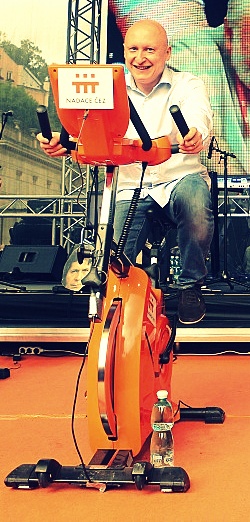Daniel "Too Big to Fail" Beneš
Insurers make millions by selling fire insurance to home owners that smoke in bed. Taxpayers that underwrite management failure at state-owned companies do not.

Spoilt brat
The stagnation of CEZ has many causes. Some are outside the power of CEZ to influence, such as German energy policy, economic recession and low wholesale electricity prices.
But there are other causes that the management and its majority shareholder have brought upon CEZ themselves. These can be bundled up into one great cause, what economists call ‘moral hazard’ and the rest of us label as ‘too big to fail’.
Every parent creates moral hazard when he allows his child to feel that it can get away with bad behaviour. In this case, the child is ‘too precious to punish’. The result is a spoilt brat.
Governments create moral hazard when they force taxpayers to bear the costs of management failure in banks and state-owned utilities like CEZ. The managers themselves remain very rich men. It is the taxpayer that gets screwed.
The majority shareholder in CEZ, on behalf of the taxpayer, has given the firm's management an assurance that it will not be held responsible. The management has been granted the extraordinary indulgence of knowing that it will never be held accountable for its actions because these have been ‘insured’ by carefully selected supervisory board members, internal auditors, and outside legal and financial advisers. Together, they manufacture moral hazard on an industrial scale.
CEZ’s profit after tax peaked in 2010 at some EUR 2 billion. Since then, it has steadily declined. This year, CEZ has forecast after tax profit of EUR 1 billion, and this in spite of having invested some EUR 25 billion over ten years into upgrading and enlarging its fleet of power plants. CEZ is running out of free cash. In the last two weeks, it has announced EUR 120 million in cuts (no details have been provided).
Of course, Daniel Benes cannot be held responsible for the collapse in wholesale electricity prices. But he can and must be held responsible for CEZ’s failure to anticipate and respond intelligently to this collapse, as well as for the long list of CEZ transactions that have destroyed shareholder value.
Many of his senior colleagues at CEZ have already left. These include Martin Roman, Alan Svoboda, Vladimir Johanes, Peter Bodnar and Vladimir Hlavinka. But unlike them, the Czech taxpayer is unable to walk away from CEZ with his pockets stuffed full of cash.
The failure of supervision at all levels in CEZ is above all the fault of the majority shareholder in the person of successive finance ministers.
If CEZ were ever to follow CSA into bankruptcy, it will have been because of the ruinous moral hazard created and exploited by Czech politicians.

Spoilt brat
The stagnation of CEZ has many causes. Some are outside the power of CEZ to influence, such as German energy policy, economic recession and low wholesale electricity prices.
But there are other causes that the management and its majority shareholder have brought upon CEZ themselves. These can be bundled up into one great cause, what economists call ‘moral hazard’ and the rest of us label as ‘too big to fail’.
Every parent creates moral hazard when he allows his child to feel that it can get away with bad behaviour. In this case, the child is ‘too precious to punish’. The result is a spoilt brat.
Governments create moral hazard when they force taxpayers to bear the costs of management failure in banks and state-owned utilities like CEZ. The managers themselves remain very rich men. It is the taxpayer that gets screwed.
The majority shareholder in CEZ, on behalf of the taxpayer, has given the firm's management an assurance that it will not be held responsible. The management has been granted the extraordinary indulgence of knowing that it will never be held accountable for its actions because these have been ‘insured’ by carefully selected supervisory board members, internal auditors, and outside legal and financial advisers. Together, they manufacture moral hazard on an industrial scale.
CEZ’s profit after tax peaked in 2010 at some EUR 2 billion. Since then, it has steadily declined. This year, CEZ has forecast after tax profit of EUR 1 billion, and this in spite of having invested some EUR 25 billion over ten years into upgrading and enlarging its fleet of power plants. CEZ is running out of free cash. In the last two weeks, it has announced EUR 120 million in cuts (no details have been provided).
Of course, Daniel Benes cannot be held responsible for the collapse in wholesale electricity prices. But he can and must be held responsible for CEZ’s failure to anticipate and respond intelligently to this collapse, as well as for the long list of CEZ transactions that have destroyed shareholder value.
Many of his senior colleagues at CEZ have already left. These include Martin Roman, Alan Svoboda, Vladimir Johanes, Peter Bodnar and Vladimir Hlavinka. But unlike them, the Czech taxpayer is unable to walk away from CEZ with his pockets stuffed full of cash.
The failure of supervision at all levels in CEZ is above all the fault of the majority shareholder in the person of successive finance ministers.
If CEZ were ever to follow CSA into bankruptcy, it will have been because of the ruinous moral hazard created and exploited by Czech politicians.

 Deník dobrovolníka: Jak jsem si připsal další bojové úlovky
Deník dobrovolníka: Jak jsem si připsal další bojové úlovky Invaze nanečisto aneb Velké dojmy z malé invaze přes tichý rybník
Invaze nanečisto aneb Velké dojmy z malé invaze přes tichý rybník Trump německému kancléři: Invaze v Normandii pro vás "nebyl příjemný den"
Trump německému kancléři: Invaze v Normandii pro vás "nebyl příjemný den" Chyba, kterou lidé nepochopí: Blažek nechce poslancům vysvětlovat, co a proč se stalo
Chyba, kterou lidé nepochopí: Blažek nechce poslancům vysvětlovat, co a proč se stalo Lidé čtěte!
Lidé čtěte!

